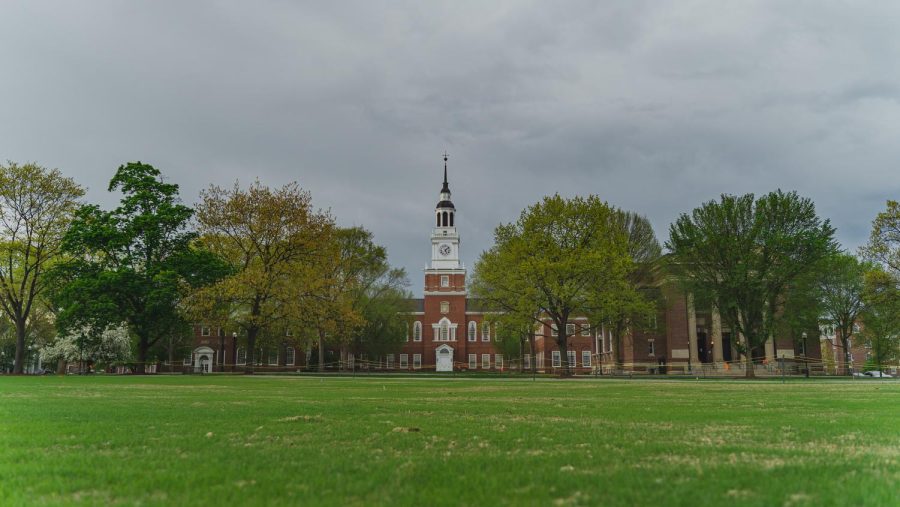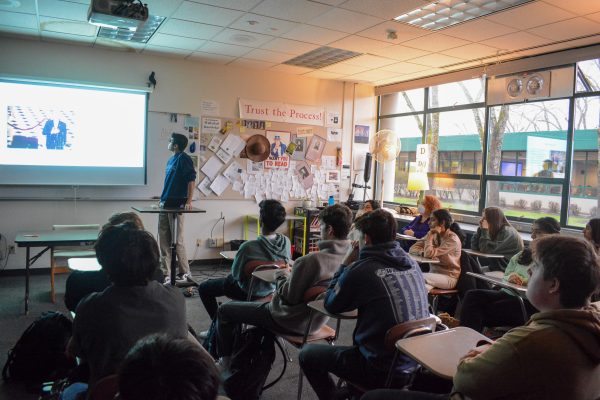Social Pressure to Attend a Prestigious College Exists, May Lead Students Astray
Students can feel pressured at a college prep school to only seek the most prestigious college or university. But is that the best choice?
For many seniors, college selection is the most daunting and significant part of the final year of high school. The application process is time consuming, and the time spent waiting for responses from chosen schools anxiety-inducing.
But apart from the nuts and bolts of application and acceptance, there is another factor at play: the underlying social pressure that values college “prestige.”
College prestige culture is not new. Throughout our society, the most exclusive and distinguished institutions of higher education have become synonymous with success. Indeed, we have created an entire “league” of schools that are considered to be the most desirable to attend. The reasons for this are numerous, and sometimes justified.
Mr. Peter Johnson, a college advisor at Jesuit, stated that while “prestige” is in the eye of the beholder, “Pursuing prestigious, highly selective institutions could be an expectation of high quality of faculty, surrounding the student with a high quality peer group, it can be based upon academic qualifications or expectations, upon legacy, or a major match that the student perceives. Families are also looking for a return on investment. They’re thinking if we’re going to spend X amount of dollars for an institution, we want to make sure that the student is going to someplace that is of high quality, and has a high return on investment.”
There is understandable pride in surmounting a low acceptance rate, a gratification that both children and their parents seek. But attending a prestigious college has become intertwined with the need to feel intellectually validated, to feel accepted amongst peers, and to feel confident about future success.
And this has created a sense of pressure among students.
“I felt pressured to pick a school that was expensive and prestigious because I didn’t want to feel judgment from other people if they didn’t know the name of the school I was going to,” said Grace Odegard, a senior at Jesuit this year.
Like Odegard, senior Fiona Oliver felt that the pressure of prestige is especially present in a college-prep environment.
“I applied early decision to a prestigious school because of an academic cultural exchange opportunity it offered rather than its name. That being said, it’s hard to go to a school as competitive as Jesuit and not care about prestige. Being able to put a top 20 college name in your bio is a badge of honor, and I feel like some students view where you go as a definition of who you are.”
Additionally, there is a reality in differences of access and upbringing that influence the sense of pressure related to prestige, as senior Sara Omer explained.
“I tried to manage my expectations based on what my chances were for admission and my family’s payment options, but still, when everyone around me was doing early decision applications I felt like I was falling behind. I feel like it’s definitely related to the culture, a lot of people here are from prestigious, affluent backgrounds. It’s the expectation that a lot of people feel they have to live up to.”
College prestige has infiltrated numerous facets of our society so that many have come to accept the idea that attending a prestigious college is the only way to achieve a successful and fulfilling career.
The truth is not so black and white.
Ultimately, it is college major, student ambition, and the accruement of social capital that have the greatest bearing on both salary and career contentment.
It has become a widely accepted belief, if not a general rule, that there is a monetary advantage to attending a prestigious school. But surprisingly, there is no wide-spread consensus in research that agrees on an exact percentage point in earning difference. This is largely owing to the fact that it is not only difficult to measure, but also varies by major.
According to Marketplace, the difference in earnings may be as much as 12% for business and humanities majors, and 6-9% for education majors. However, there is little to no difference for those pursuing STEM careers.
Much of these differences in earnings are not due to the name of the institution, but instead, basic societal patterns.
Firstly, larger and more prestigious institutions have larger applicant pools to draw from. This means that they can select for admission those students who show a high level of ambition and success, effectively creating groups of people within their institution that may already be most likely to succeed.
Prestigious institutions, by way of notoriety, legacy, and cost of attendance, also tend to attract the already wealthy. This draws in those privileged students that have had access to vital educational resources like better schools and test preparation.
Due to this, much of the difference in income can be chalked up to networking opportunities.
This is specifically shown in the difference in earnings for business majors, for whom networking is all the more important. These opportunities for the building of social capital are more readily accessible in a crowd that consists of the children of business moguls, and an alumni network based in high society.
For majors like STEM in which there are standardized teaching and major requirements, this advantage in networking is often inconsequential.
Additionally, graduates from prestigious institutions are also more likely to go on to obtain a higher degree of education, such as a masters, doctorate, or Ph.D., further contributing to the gap in pay. This does not mean that students who attend mid-tier universities are barred from this opportunity to gain an edge in the career market after receiving their undergraduate degree.
All in all, the reasons that students from selective universities perform marginally better than their peers in mid tier institutions has the most to do with the nature of the student and their major more than the name of the school they attended.
Perhaps most compelling is the fact that there is virtually no connection between the prestige of a school, and the level of career fulfillment and happiness attained by its students.
The Strada-Gallup Alumni Survey, previously called the Gallup-Purdue Index Report, surveyed 30,000 American college graduates of varying ages about their college experience, and discovered that attending a private college or a highly selective one is not a definite precursor to success. Instead, the things that really matter are establishing a deep connection with a mentor, taking on a sustained academic project, and playing a significant part in a campus organization.
In fact, for many students, access to faculty and mentoring services, social connection, or admission into an honors program may be more attainable at a smaller, less selective school.
In the words of New York Times columnist Frank Bruni, “It’s not where you go to College, but how you go to college.” Overall, the nature of the student, rather than the school, is what matters most.
This does not mean that a prestigious education is useless, or that it does not have its benefits, it merely means that it is not necessary to the success of every student.
But why does this matter? Why does it matter that we set the narrative straight when it comes to school prestige and success?
The answer is both central to our experiences as upcoming college students in broader society, and to our specific school culture.
While higher education is becoming increasingly important to success, it is also more expensive than ever before.
According to CNBC, in the 2021-22 academic year, “average tuition and fees rose by just 1.3% to $3,800 for students at two-year schools; 1.6% for in-state students at four-year public colleges, reaching $10,740; and 2.1% for students at four-year private institutions, to $38,070.” This, combined with rising rates on student loans means that many families and students are facing a daunting financial burden.
A burden that is exacerbated by the trickle-down societal and peer pressure that says that attending higher education is only important if it’s prestigious, selective, and socially acceptable.
The simple fact of the matter is that a prestigious education is an exceptionally expensive one. The average cost of an Ivy league college comes out to just under 60,000 dollars a year, and around 40,000 for most other private colleges.
For many, applying to schools like this is simply not an option, regardless of academic achievement or intelligence.
And while pressure surrounding college prestige is not at all unique to Jesuit high school, the college preparatory atmosphere at Jesuit may exacerbate the already existing societal pressure to attend a school with a vaunted name.
As students, some of whom are close to graduating, it may be time to examine the culture that we are creating surrounding higher education. It is easy to feed into an educational and social structure that ultimately, we are all a part of in some way or another as human beings and students.
Are we worshipping an ideal of college perfection that may not exist?
We all want success, we all want to find our niche, our fulfillment, our happiness in a career and livelihood. Now, more than ever, it is important that students make the choice that is best for them as an individual, with individual goals, finances and family structures.
And as we go out into the world as Jesuit High School graduates seeking college degrees, we need to create that world into a place that values advancement in education not for societal status, but for the betterment of people.
How did Laney get to her position? See her research below.
- https://www.investopedia.com/articles/personal-finance/051915/university-prestige-really-important.asp
- https://hbr.org/2020/09/graduates-of-elite-universities-get-paid-more-do-they-perform-better
- https://www.theatlantic.com/business/archive/2015/08/does-college-matter/400898/
- https://www.nytimes.com/2018/08/17/opinion/college-students.html?scrlybrkr=426dd3b1
- https://cci.stradaeducation.org/press-release/new-strada-gallup-alumni-survey-data-confirm-critical-role-of-faculty-as-main-source-of-mentorship-but-less-than-half-of-graduates-report-they-had-a-mentor-in-college/
- https://www.nytimes.com/2018/08/17/opinion/college-students.html
- https://www.edmit.me/blog/will-attending-a-more-selective-school-guarantee-future-success
- https://www.scribd.com/document/258627566/Where-You-Go-is-Not-Who-You-ll-Be#
- https://www.collegedata.com/resources/pay-your-way/whats-the-price-tag-for-a-college-education
- https://www.nytimes.com/2015/09/13/opinion/sunday/frank-bruni-how-to-measure-a-colleges-value.html
https://www.gallup.com/services/176768/2014-gallup-purdue-index-report.aspx - https://www.cnbc.com/2022/07/15/inflation-is-suddenly-making-college-more-expensive-than-ever.html#:~:text=Inflation%20drives%20college%20tuition%20prices%20higher&text=For%20the%202021%2D22%20academic,year%20private%20institutions%2C%20to%20%2438%2C070.
- https://www.marketplace.org/2022/04/21/prestige-doesnt-always-maximize-the-value-of-a-degree/














